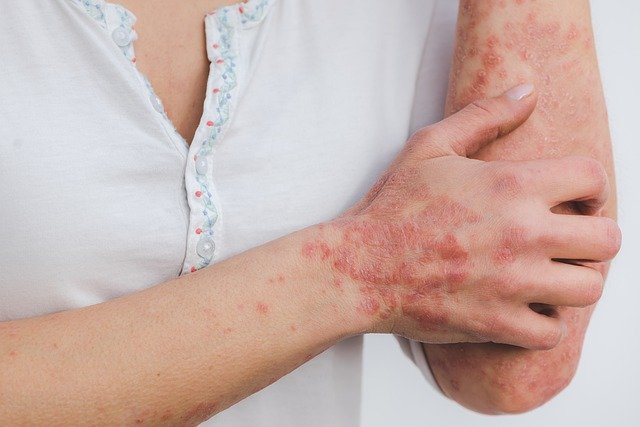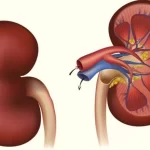What is Psoriasis?
Psoriasis is a skin disease during which skin cells start multiplying at an abnormal level. Usually, cell regeneration takes place and there’s a balance with the dead skin cells. As skin cells begin to develop abnormally, they reach the highest of your skin and leave behind a red plaque covered with white scales. they typically occur within the knees, elbows, and sometimes on your scalp. There are many reasons why skin cells behave abnormally. The common reason is that they are linked to the way your system performs.
The disease is characterized by the multiplication of skin cells up to 10 times faster than normal growth. because the dead underlying cells reach the surface of the skin, they cause accumulation, red plaques that are covered with white scales. This disease usually occurs on the elbows, knees, and scalp. Psoriasis also can affect the palms, trunk, and soles of the feet. Psoriasis also can be found sometimes related to rheumatoid arthritis, which causes swelling and pain within the joints. it’s estimated that 10 to 30 percent of individuals in India who have psoriasis suffer from rheumatoid arthritis.
What are the various sorts of Psoriasis?
Psoriasis is often caused thanks to many reasons starting from trauma, emotional stress to streptococcal infection. A recent study of the disease has indicated that some abnormality within the system is that the factor that triggers the disease. There are five different types of psoriasis:
Plaque Psoriasis: This is often a kind of psoriasis which is red raised patches on the skin. These are covered by silvery dead skin cells.
Guttate Psoriasis: It causes small red patches on the skin. This happens after the patient becomes ill.
Inverse Psoriasis: this sort of psoriasis usually occurs within the folds of the skin. It causes soreness and red spots on the skin.
Pustular psoriasis: this sort of psoriasis fills with pus on the palms and soles. These are painful and itchy at an equivalent time. It causes flu-type symptoms which include fever, dizziness, loss of appetite, etc.
Erythrodermic psoriasis: it’s sort of a severe sunburn because it makes the skin bright red. during this sort of psoriasis, there’s a quick pulse, itching, and pain. It should be mentioned that this is often an emergency that ought to be consulted by a doctor.
What are the symptoms of psoriasis?
- Swollen and red skin patches that are covered by lumpy, loose scales. they will be painful, itchy, and sometimes crack and bleed.
- Fingernails and toenails can form and alter the color. it’s going to also begin to crumble or break away the nail beds.
- Scales and patches or crusts may form on the scalp of psoriasis patients.
What are the causes of psoriasis?
The exact explanation for psoriasis is unknown, but there might be many other factors that will cause psoriasis.
Immune system: Our system helps keep us safe from viruses and bacterial infections, but if something goes wrong, our system starts performing on the other side. Researchers believe that the system is one of the explanations for psoriasis. When our system is functioning overactive, it causes inflammation inside the body. an outsized number of healthy cells are produced. These extra cells then start coming to the surface of the skin very quickly. the various skin cells appearing on your skin are psoriasis. it’s red in color and causes swelling of the skin.
Hormonal Changes: During puberty or menopause, these issues are often seen on the skin. If you’re a pregnant woman, you’re likely to possess psoriases. Once the delivery is completed, you’ll again see it on the surface of the skin.
Alcohol: people that regularly drink alcohol have a better risk, especially in young men. It should even be mentioned that alcohol also makes the treatment less effective.
Medication: Certain medications like lithium (which treats manic depression and mental illness), high vital sign medications (including propranolol, beta-blockers, ACE inhibitors, quinidine), antimalarial drugs (including chloroquine, hydroxychloroquine, Plaquenil, and quinacrine ) may increase. there’s more to psoriasis.
HIV: Patients affected by HIV are more susceptible to develop psoriasis. But, as soon as you begin treatment for HIV, you’ll see yourself better.
Sunlight: the touch of sunlight is sweet for health because it provides natural vitamin D to the body. But sometimes, sunburns can worsen the condition, so it’s advisable to require proper care of your skin before going call at the sun.
How to diagnose psoriasis?
Your doctor can check if you’ve got psoriasis or if you’ve got plaques on your ears, nails, elbows, scalp, belly button, and knees. If the doctor remains unclear, he will take a little sample of your skin which is understood as a biopsy. Later, it’ll be sent to a lab and your skin sample is going to be examined under a microscope. this may make it clear what sort of psoriases you’ve got or what sort of infection or disease you’re affected by.
How is psoriasis treated?
As said earlier the treatment plan aims to first stop your skin cells from multiplying. Post-treatment focuses on getting your skin back in shape. to realize this, multiple treatments are often done at an equivalent time. Your doctor will examine the character of your skin and identify the possible cause before starting the treatment. the foremost common method would be the utilization of topical creams. These are ointment-based and applied on your raw skin and your affected area. Results could also be slow, but still, this treatment works effectively in 60% of cases.
This ointment is often a mixture of 2-hydroxybenzoic acid, coal tar, anthralin, etc. Light therapy also can work against the exploitation of skin cells. These treatments use natural or UV light on the skin to regulate cell expansion.
Your doctor will guide you about the sort of sunshine to use and therefore the amount of exposure you would like. In some cases, you’ll take oral medications or injectable medicines to stop glare. It should be noted that not all of these medicines work for everybody. Hence care should be taken to spot your skin type and your health condition before getting these medicines. you’ll discuss and consult your doctor about these medicines.
Home remedies for psoriasis
Many people attempt to treat psoriasis with allopathic remedies, but the disease isn’t treated properly. during this case, Ayurvedic remedies can give far better results. you’ll do these ayurvedic remedies:-
Turmeric And perfume
Make a paste of turmeric and perfume. Apply it every morning and evening. It cures psoriasis. this is often a beneficial recipe.
Treatment of psoriasis with alum
Take a shower with alum water. It removes itching and dryness caused by psoriasis. For this, put 2 cups of alum within the bathwater. Keep the affected part immersed in water for a quarter-hour.
Treatment of psoriasis with burn plant
Take out the pulp of a fresh burn plant leaf and apply it to the affected area. you’ve got to massage with light hands. Doing this daily gives relief from itching.
Your diet in psoriasis
Not eating nutritious food also increases the danger of this disease. aside from this, having stress and mental disorders, habits like alcohol and smoking also can aggravate psoriasis. Therefore, your diet in psoriasis should be like this:-
- Eat nutritious food.
- Stay away from alcohol, smoking, etc.
Your Lifestyle in Psoriasis
In psoriasis, your lifestyle should be such the disease are often cured soon:-
- Try to live a stress-free lifestyle.
- Try to keep the skin dry.
- Protect skin from strong sunlight.
- Do not take medicine without a doctor’s advice
The side effect of the drug also causes psoriases. Psoriasis is often caused by taking pain-relieving drugs, malaria, blood pressure-lowering drugs. If the disease is already there then it can worsen.
Who will need psoriasis treatment?
People who are diagnosed with psoriasis could also be eligible for treatment. it’s always better to treat psoriasis-like topical creams and UV light therapy symptoms and choose advanced tools. The treatment aims to prevent the skin cells from growing rapidly and reduce inflammation. They aim to scale back the scales to the utmost permissible limit.
Who isn’t eligible for the treatment?
Topical creams are often applied by everyone. However, for advanced medications and procedures, consult your doctor about the sort of therapy you’d prefer. Also, ask your doctor about your allergy symptoms and obtain the medicines and medicines that are best suited for you. a number of the medicines used are often strong. Hence it’s always better to consult your doctor before taking any medicine on your own.
What are the side effects of psoriasis treatment?
It may depend upon your skin type and therefore the possibility of other medical conditions. Topical creams that make your skin smooth also correct it and haven’t any side effects. However, if you’re going for advanced procedures, then there are chances that it’d cause some allergies in you. However, most treatments for psoriasis are considered safe and are proven over the years. If you’ve got concerns you’ll ask your doctor.
What are the post-treatment guidelines?
Post-treatment Your skin should have some symptoms leftover from treatment. you’ll be advised to use a light skin moisturizer and keep your skin pimple-free. Although sunlight is often good for your skin, overexposure is often harmful. So ask your doctor about the proper exposure and lookout of your skin accordingly. Also, confirm your skin is freed from impurities by regular cleansing with soap and water.
How long does it fancy recover?
The recovery period depends on your skin type and therefore the nature of the treatment. for a few individuals, the results could also be immediate, while for a few individuals the effect may take a while. The doctor will initially check how well you’re responding to treatment and should make changes if you are doing not get the specified results.
What is the value of psoriasis treatment in India?
In India, the value of treatment depends on the sort of clinic or center you select. the typical price can start from INR 1000 and go up counting on the sort of treatment. When choosing a center, choose a clinic with an honest reputation.
Is Psoriasis Curable?
Alternative treatments may include psoriasis treatment in homeopathy. the utilization of a specific supplement and dosage of diet plays a serious role. Antioxidant properties are found in burn plant gel. So you’ll think about using it. Also, animal oil is understood to ease the symptoms to an extent. you’ll also try using the herbal cream for a quick duration and see the results after consulting your doctor.
What are the house remedies for psoriasis?
As a home remedy for this ailment, applying a thick cream or lotion, then wicking moisture with an ointment like petrolatum or vegetable oil, helps to alleviate the conditions of this disease. Because it makes dry skin itching and burning worse. However, using very thick creams during the summer months as sweat mixed with creams often makes psoriases worse. Another kitchen remedy for psoriasis is to wrap your skin with plastic or a bandage before getting to bed and wash the areas gently with cool water in the morning.
What are the treatment options?
Alternative treatments may include psoriasis treatment in homeopathy and psoriasis treatment in Ayurveda. a specific diet and therefore the use of dietary supplements play a crucial role.






